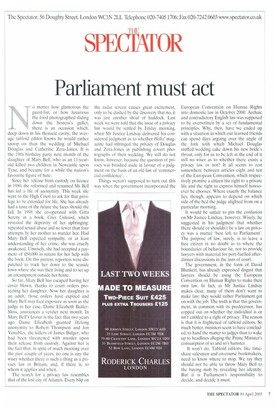Parliament must act
N• o matter how glamorous the guest-list, or how luxurious the food photographed sliding . down the hostess's gullet, there is an occasion which, deep down in his thoracic cavity, the average tabloid editor knows he would rather snoop on than the wedding of Michael Douglas and Catherine Zeta-Jones. It is the 19th birthday party next month of the daughter of Mary Bell, who as an 11-yearold killed two children in Newcastle upon Tyne, and became for a while the nation's favourite figure of hate.
Since her release from custody on licence in 1980. the reformed and renamed Ms Bell has led a life of anonymity. This week she went to the High Court to ask for that privilege to be extended for life. She has already had a taste of the future she faces should she fail. In 1998 she co-operated with Gitta Sereny in a book, Cries Unheard, which revealed the depravity of her upbringing: repeated sexual abuse and no fewer than four attempts by her mother to murder her. Had Mary Bell expected sympathy, or at least understanding of her crime, she was cruelly awakened. Unwisely, she had accepted a payment of £50,000 in return for her help with the book. On this pretext, reporters were dispatched to track her down to the seaside town where she was then living and to set up an encampment outside her home.
So far, Mary Bell has escaped having her cover blown, thanks to court orders protecting her daughter. Now her daughter is an adult, those orders have expired and Mary Bell may face exposure as soon as the judge in her case, Dame Elizabeth ButlerSloss, announces a verdict next month. In Mary Bell's favour is the fact that two years ago Dame Elizabeth granted lifelong anonymity to Robert Thompson and Jon Venables, the killers of James Bulger, who had been threatened with murder upon their release from custody. Against her is the fact that, in spite of much mooting over the past couple of years, no one is any the wiser whether there is such a thing as a privacy law in Britain, and, if there is, to whom it applies and when.
The search for a privacy law resembles that of the lost city of Atlantis. Every blip on
the radar screen causes great excitement, only to be dashed by the discovery that no, it was just another shoal of haddock. Last week we were told that the issue of a privacy law would be settled by Friday morning, when Mr Justice Lindsay delivered his considered judgment as to whether Hello! magazine had infringed the privacy of Douglas and Zeta-Jones in publishing covert photographs of their wedding. We still do not know, however, because the question of privacy was brushed aside in favour of a judgment on the basis of an old law of 'commercial confidence'.
Things weren't supposed to turn out this way when the government incorporated the European Convention on Human Rights into domestic law in October 2000. Archaic and contradictory English law was supposed to be overwritten by a set of fundamental principles. Why, then, have we ended up with a situation in which our learned friends can spend days arguing over the angle of the fork with which Michael Douglas stuffed wedding cake down his new bride's throat. only for us to be left at the end of it still no wiser as to whether there exists a privacy law or not? It all seems to rest somewhere between articles eight and ten of the European Convention, which respectively promise a citizen the right to a private life and the right to express himself howsoever he chooses. Where exactly the balance lies, though, appears to depend on which side of the bed the judge alighted from on a particular morning.
It would be unfair to pin the confusion on Mr Justice Lindsay, however. Wisely, he suggested in his judgment that whether there should or shouldn't be a law on privacy was a matter 'best left to Parliament'. The purpose of law, surely, is to leave a free citizen in no doubt as to where the boundaries of behaviour lie, not to provide lawyers with material for port-fuelled afterdinner discussions in the inns of court.
The government, in the form of David Blunkett, has already expressed disgust that lawyers should be using the European Convention on Human Rights to make their own law. In fact, as Mr Justice Lindsay makes clear, many of them don't want to make law; they would rather Parliament got on with the job. The truth is that this government, in common with its predecessor, has copped out on whether the individual is or isn't entitled to a right of privacy. The reason is that it is frightened of tabloid editors. So much better, ministers seem to have concluded, to hand the matter to judges than to wake up to headlines alleging the Prime Minister's consumption of so and so's hamster.
It won't do. Tabloid editors, like timeshare salesmen and on-course bookmakers, need to know where to stop. We say they should not be able to throw Mary Bell to the baying mob by revealing her identity. But it is Parliament's responsibility to decide, and decide it must.


































































 Previous page
Previous page